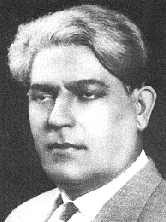João Pernambuco
João Pernambuco (born November 2, 1883 in Jatobá , † October 16, 1947 in Rio de Janeiro ), whose real name is actually João Teixeira Guimarães , was a Brazilian guitarist and composer .
Life
As a child of Indian-Portuguese descent, he moved with his parents to Recife at the age of 12 , where he learned a lot musically from singers and guitarists from the Sertão (the mountainous country in Brazil). In a short time he developed himself into a remarkable guitarist. In Recife he also learned the trade of blacksmith . Although he was illiterate , he became a profound expert on folk culture and the guitar.
In 1902 he moved to Rio de Janeiro, where he accepted a position as an assistant in the prefecture . In Rio de Janeiro he got to know many important musicians like Donga , Pixinguinha , Catulo da Paixão Cearense and Satyro Bilhar , with whom he played together. He founded the group Grupo do Caxangá , from which the Oito Batutas later emerged. From 1911 he wrote many compositions such as Caboca di Caxangá , which in 1914 became a great success at the carnival . The themes of his compositions were often inspired by Brazilian folk music. He recorded many records with important Brazilian musicians of his time.
Selection of works
- A canção de seus olhos
- Aperitivo
- Brasileirinho
- Brejero (cheeky badger)
- Caboca di Caxangá
- Dengoso (coquettish)
- Estou voltando
- Estrada do sertão
- Graúna
- Interrogando (asking)
- Luar do sertão
- Mimoso (tenderly)
- O amor ea pink
- Pó de mico (itching powder)
- Preto e Branco (black and white)
- Rebolico (confused)
- Sonho de Magia
- Rosa carioca
- Sons de carrilhões (bell sounds)
- Suas mãos
- Valsa em lá
Web links
- Works by and about João Pernambuco in the catalog of the German National Library
- João Pernambuco at Allmusic (English)
- João Pernambuco at CliqueMusic (Portuguese)
| personal data | |
|---|---|
| SURNAME | Pernambuco, João |
| ALTERNATIVE NAMES | João Teixeira Guimarães |
| BRIEF DESCRIPTION | Brazilian guitarist and composer |
| DATE OF BIRTH | November 2, 1883 |
| PLACE OF BIRTH | Jatobá |
| DATE OF DEATH | October 16, 1947 |
| Place of death | Rio de Janeiro |
